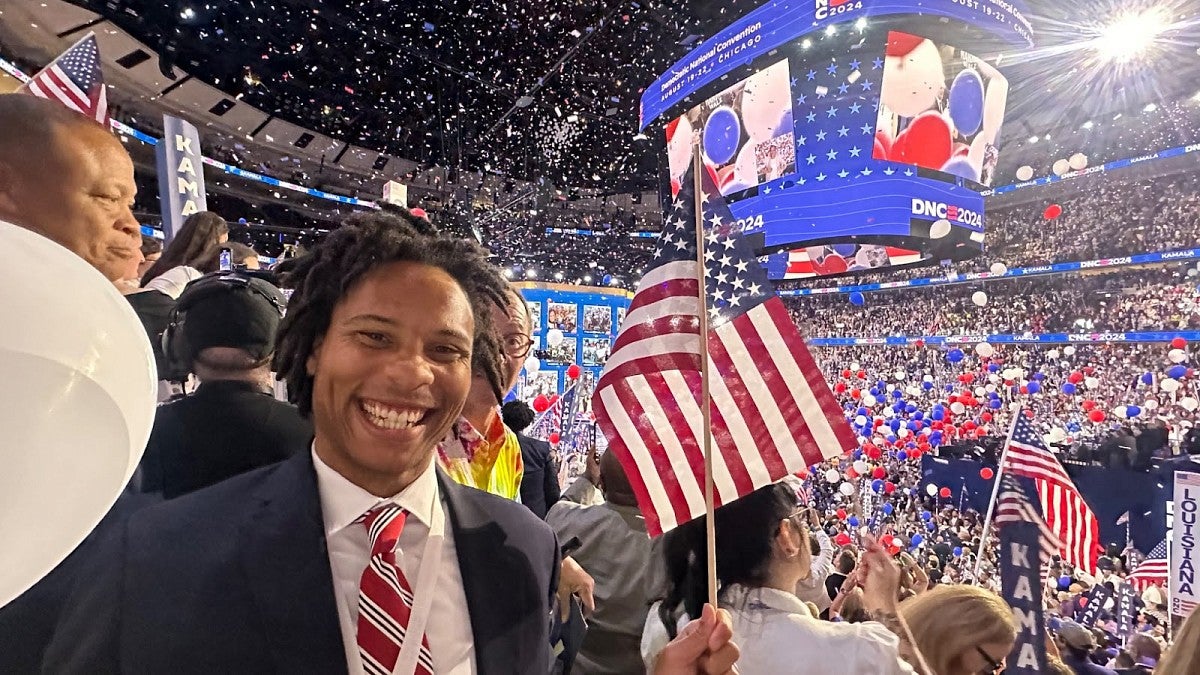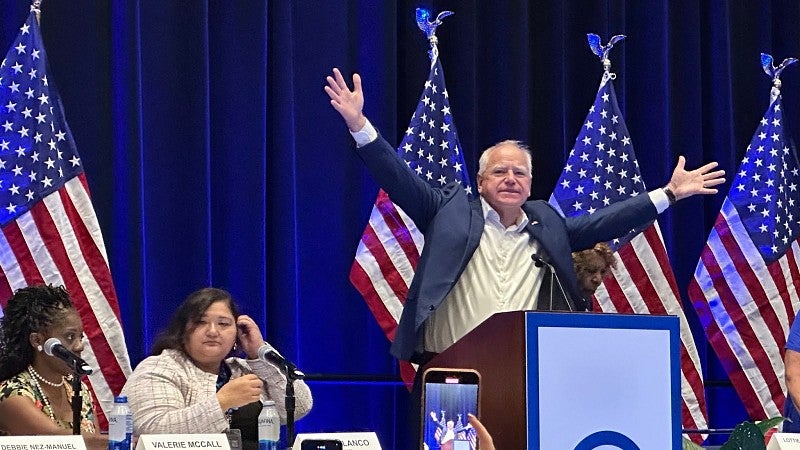
Experiential Learning | Research & Innovation | Community Impact | Career Preparation | Teaching Excellence | 21st Century Liberal Arts | Building Community | Good Vibes | CAS Spotlights | All Stories | Past Issues

August 29, 2024
Democracy at the Ground Level
As the balloons and confetti dropped from the rafters of the United Center in Chicago after Vice President Kamala Harris's nomination acceptance speech, I saw a new generation take the reins of the Democratic Party.
In mid-August, I attended the 2024 Democratic National Convention (DNC) as a district-level delegate. This was my first presidential nominating convention. The state of Oregon has 78 delegates, 12 of whom are elected officials known as superdelegates. The other 66 are “pledged” delegates, elected at the local and state level by the members of the Democratic Party of Oregon. Delegates represent the state at the National Convention and vote on the nominees for president and vice president. I was elected as one of eight delegates to represent Oregon’s 4th Congressional District. A presidential candidate must win a majority of the 3,933 pledged delegates to secure the Democratic Party’s nomination on the first ballot.
Held every four years, Republican and Democratic national conventions nominate candidates for president and vice president, adopt a party platform, deliberate, and unite behind a shared vision for America’s future. With delegates pouring in from every corner of the United States, the conventions are a spectacular manifestation of each party’s collective will.
The DNC’s main events took place at the United Center. The arena was packed with thousands of exuberant politicos each night, keenly aware of the history-making nomination of the first-ever major party nomination of a Black and South Asian woman.
After months of dismal polls and Biden’s debate performance, many Democrats were anxious about the party’s prospects in November. Harris’s ascendancy and well-orchestrated moves after Biden passed the torch have infused the party faithful with joy and hope. The historic nature of Harris’s candidacy and the sheer improbability of how it unfolded have undoubtedly re-invigorated the party, which was evident throughout the United Center for the duration of the convention.
The speakers at the DNC encouraged and emphasized this collective sentiment, and it didn’t undermine the moment’s authenticity. The excitement was palpable. The memory of Hillary Clinton’s loss in 2016 undoubtedly curbed any premature overconfidence, yet the determination to prevent a similar outcome in 2024 fueled a strong sense of resolve and urgency to finish the job.
During the convention, I slept about four hours a night, as the convention’s schedule was jam-packed with caucuses, evening speeches, and parties afterward. Each morning, the Oregon delegation met early to eat breakfast, receive logistical details and listen to speeches from notable Oregon state elected officials, such as Gov. Tina Kotek, Sens. Jeff Merkley and Ron Wyden, Attorney General Ellen Rosenblum, as well as influential political figures outside the state such as AFL-CIO President Liz Shuler (University of Oregon journalism, ’92) and United States Secretary of Energy Jennifer Granholm. These breakfasts were great opportunities to meet my fellow Oregonians from across the state.

I also attended caucuses held at the McCormick Convention Center, such as the Black Caucus and Women’s Caucus. The caucuses also featured distinguished speakers, including Minnesota Gov. and current Vice President nominee Tim Walz, former Speaker of the House Nancy Pelosi, and New Jersey Sen. Cory Booker, among many others. The close-knit atmosphere allowed me to talk to many of these people one-on-one. I found the elected officials approachable, passionate, and energetic.
I met scores of delegates, too. Most of them were committed public servants. Patriotism was a theme of the convention, and rightfully so. Many of the delegates I met expressed fulfillment in quietly working behind the scenes, helping others achieve their dreams. I especially enjoyed conversations with seniors who have devoted decades to noble causes like voting and women's rights. From young activists to presidents and former presidents, it was clear that most people in attendance participated in politics not for personal gain but for a desire to better their community.
As a political scientist, I was most impressed by the depth of feeling at the convention. The most effective speeches made powerful emotional appeals. Compelling stories, not well-organized logical arguments, routinely elicited the most vigorous applause. Excitement was the most prevalent emotion.
Both major political party conventions—the Republican Convention in mid-July and the DNC—are heartening opportunities to see the US’s democracy at work, where ordinary party activists can come together with political power brokers to generate momentum to elect the next president of the United States.
As the party’s chosen nominee for president, Harris expressed humility in her acceptance speech. Although the buzz around her campaign had already launched her ahead in the polls, ushered in record-breaking donations, and revitalized the party, she still considers herself an underdog. As such, there were no celebrations after Harris’s speech because the presidency is the real prize.
— Chandler James is an assistant professor in the Department of Political Science. He studies the American Presidency, public opinion and political behavior.
— Editor’s note: The views expressed are those of Chandler James and not those of the university, his academic unit or the college.
